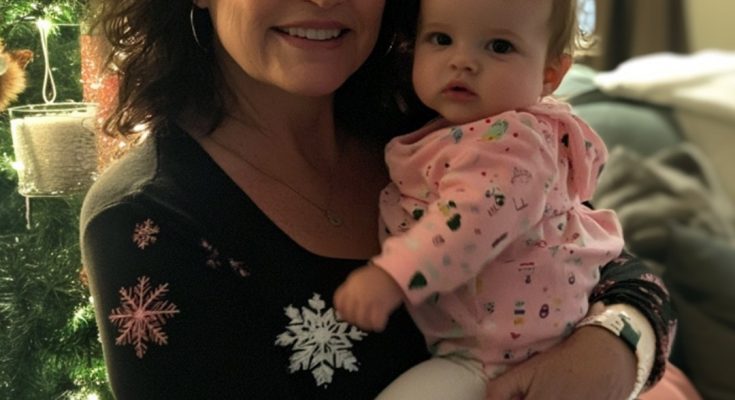All I ask is a few minutes of your time to hear my ordeal. Months after providing free childcare for my stepdaughter, I made a choice to refuse when things went too far. Now I need you to tell me — was I really wrong for not giving in to her bizarre demands and refusing to babysit her child?
Retirement was supposed to be my time to relax, travel, and maybe take up gardening. Instead, I became “Grandma Daycare,” a title I wore proudly. I’d retired when my first grandchild was born, and over the years, I’d babysat all five of my grandchildren, both from my kids and stepkids.
“Grandma, tell us the story about the dancing bear again!” little Tommy would beg, his eyes sparkling with excitement.
“No, the princess one!” Lily would counter, climbing onto my lap.
Those moments made my heart swell. Their laughter was worth every second of exhaustion, even on the hardest days. It wasn’t always easy, but I loved it.
Whether it was finger painting, bedtime stories, or comforting a feverish toddler, I poured my heart and soul into caring for them. My days were busy but fulfilling.
“You’re a miracle worker,” my son James once said, watching me juggle three kids while baking cookies. “I don’t know how you do it.”
“Love,” I replied simply. “Love makes everything possible, dear.”
Alice, my stepdaughter, was the last one to have a baby. Her daughter, Ellie, was born when my schedule was already full. I watched my 18-month-old grandson Monday through Friday and handled the older kids during summer breaks.
I wasn’t sure I could take on another child, but I was open to helping where I could.
Unfortunately, Alice and her boyfriend, Sam, made that almost impossible.
Alice and Sam had always been a bit high-maintenance, but I wasn’t prepared for the three-page list they handed me when Alice was just ten weeks pregnant.
“We’ve put together some rules,” Alice said, her voice overly casual. “If you’re going to babysit my baby, you’ll need to agree to these.”
I skimmed the list, and my jaw nearly hit the floor.
“I can’t cook? I can’t have more than one other grandchild over? And what’s this about my cat? Muffin has to stay out of the baby’s rooms, even when your baby’s not here?” I looked at them incredulously. “This is… a lot.”
Sam folded his arms. “It’s for our baby’s safety.”
“Safety?” My voice rose. “I raised three children, helped raise two stepchildren, and have been caring for four grandchildren without a single incident. What exactly are you implying about my capabilities?”
“Times have changed, Ruby,” Sam said dismissively. “There are new studies, new recommendations —”
“New recommendations about cooking?” I interrupted, my hands trembling with anger. “About having siblings and cousins around? About cats that have been part of the family longer than you have?”
“Mom,” Alice pleaded, “we just want what’s best for our baby.”
“I’m sure you mean well,” I said, handing the list back, fighting to keep my voice steady, “but this won’t work for me. You’ll need to find other childcare.”
Their faces fell, but I stood my ground.
Months later, Alice called me in a panic. Her voice cracked with desperation. “Mom, our sitter canceled last minute. Can you watch Ellie tomorrow? Just for the day?”
I hesitated. “You know I won’t be following those rules, right? I’ll provide safe and appropriate care, but I won’t be micromanaged.”
Alice sighed. “That’s fine. We just really need help.”
That “one day” turned into four months. While Alice was somewhat tolerable, Sam was a nightmare. Every time he picked Ellie up, he’d make snide comments about Muffin, the number of kids I had over, or whether I’d cooked that day.
One afternoon, as I read to Ellie and her cousin, Sam arrived early.
“Well, well,” he sneered, “I see we’re breaking rules again. Two kids at once? How dangerous.”
I held Ellie closer, feeling her tiny fingers grip my shirt. “Sam, if you have concerns, we can discuss them like adults. But not in front of the children.”
He scoffed. “I guess we don’t have a choice but to put up with this for now.”
And the other day, he said, “I guess you’re happy you won, Ruby.”
By Sunday nights, I’d started dreading the week ahead. The joy I once felt watching my grandkids was overshadowed by Sam’s constant negativity and Alice’s relentless questioning:
“Did the baby cry? Did you change her diaper twice? Did you feed her?”
I had raised kids on my own — did they really think I was new to this whole motherhood thing? Some days were worse than others, but I let it slide, chalking it up to them being “new parents” trying too hard to get everything right.
Thanksgiving was the breaking point. I’d told Alice and Sam well in advance that I’d have all my grandkids over during the holiday break. But Sam wasn’t happy.
“This isn’t safe,” he said during one particularly tense pickup. “You can’t watch all those kids and take care of Ellie properly.”
“I’ve been doing this for years, Sam,” I said, trying to keep my voice level. “All these children are family. They love each other, they look out for each other, and there’s nothing to worry about here.”
“That’s not good enough,” he interrupted. “Ellie needs individual attention. She needs —”
“Then make other arrangements,” I said calmly.
Of course, they didn’t.
On the first day of Thanksgiving break, Sam picked Ellie up and made another snide comment, this time directly to her. “I’m sorry, my baby. I guess we have no choice but to leave you in an unsafe situation to be neglected.”
My heart shattered. Seven-month-old Ellie might not have understood the words, but I felt humiliated. Her lower lip trembled, and she began to cry.
“How dare you,” I whispered, my voice shaking with rage. “How dare you poison her against me? Against her family?”
I scooped Ellie up, soothing her tears while glaring at Sam. “You can criticize me all you want, but don’t you dare use this precious child as a weapon in your petty war.”
Sam opened his mouth to argue, but I cut him off. “You may think you’re the expert at everything, but let me remind you — respect is earned, not demanded. And right now? You’re running on empty.”
Sam scoffed, crossing his arms. “Respect? You mean like the respect you show by ignoring our rules? Funny, because from where I’m standing, you’re the one who’s out of line.”
That was it.
I called Alice that night, my voice hoarse from holding back tears. “You have two weeks to find other childcare. And from now on, Sam is not welcome here. If he comes to pick Ellie up, I won’t watch her again.”
“Mom, please,” Alice begged. “He didn’t mean —”
“He meant every word,” I cut her off. “And your silence makes you complicit. Two weeks, Alice. That’s final.”
Alice reluctantly agreed, and for a while, things improved. However, on New Year’s Day, I received several texts from friends with screenshots of a post that Sam had made on his social media page.
“Thankful we finally found someone safe to watch Ellie after dealing with a HORRIBLE babysitter,” the post read. He tagged me and added, “Some people just aren’t cut out for childcare.”
What hurt the most? Alice had liked the post.
I was LIVID. After months of free childcare, enduring Sam’s endless criticism and Alice’s never-ending demands, this was how they repaid me? I collapsed into my husband’s arms, sobbing.
“Thirty years,” I choked out. “I’ve been caring for children for 30 years. How can they say I’m not cut out for it?”
“They’re wrong,” he whispered, stroking my hair. “Everyone knows they’re wrong.”
I decided right then and there: I was done.
A few days later, Alice called again. “Mom, the daycare dropped Ellie. Can you start watching her again?”
I took a deep breath, steadying myself against the kitchen counter. “I’m sorry for your situation, Alice, but I can’t do it. I don’t feel comfortable watching Ellie anymore.”
“Please, Mom,” she sobbed. “We don’t have anyone else. I might have to quit my job!”
“Maybe you should have thought about that before letting Sam publicly humiliate me. Before liking his cruel post.”
“That was stupid, I know,” she admitted. “I just… I felt trapped between you and him. Please, Mom. We’ll do anything.”
“I’m sorry, sweetheart,” I whispered, tears rolling down my cheeks. “But sometimes ‘anything’ comes too late.”
Later, I found out the truth. The daycare hadn’t dropped Ellie — her parents had left because they couldn’t afford it. Alice and Sam hadn’t realized daycare didn’t provide essentials like diapers, wipes, and formula. They’d assumed $350 a week covered everything. Sam had also been shocked to learn that one worker cared for five infants at a time.
Now, they were scrambling. Sam had to sell his dirt bike, and Alice sold all her designer handbags to afford their child’s daycare.
My husband and stepson think I should reconsider for Ellie’s sake. “Sam’s the problem,” they argue. “Why punish Alice and Ellie for his behavior?”
One night, during a heated family dinner, my stepson took a jab at me. “If this were your own daughter’s child, you’d forgive and move on.”
The room fell silent. I set down my fork, hands trembling.
“How dare you,” I whispered, tears stinging my eyes. “How dare you suggest I love any of my grandchildren less than others. I’ve poured my heart and soul into this family for decades. I’ve loved your children as my own. But love doesn’t mean accepting abuse.”
“Mom’s right,” my daughter Sarah spoke up, her voice fierce. “You all saw how Sam treated her. How Alice enabled it. Would you let someone treat your mother that way?”
My stepson’s words stung, but they weren’t true. I’d always treated my stepkids and biological kids equally. The difference was respect. My own kids and their spouses respected me. But Alice and Sam didn’t.
Ellie eventually returned to daycare, and I felt a weight lift off my shoulders. I could finally enjoy my time with my other grandkids without Sam’s negativity hanging over me.
One morning, while watching my grandson paint, he looked up at me with serious eyes.
“Grandma,” he said, “why doesn’t cousin Ellie come anymore?”
My heart clenched. “Sometimes, sweetheart, grown-ups have disagreements that make it hard to be together. But that doesn’t mean we love Ellie any less.”
“I miss her,” he said.
“Me too, baby,” I whispered. “Me too.”
Alice and Sam are learning the hard way that free childcare isn’t a right — it’s a privilege.
So, am I wrong for refusing to keep watching Ellie? Maybe. But respect is a two-way street. If they can’t appreciate the help they’ve been given, they’ll have to figure it out themselves.
Last week, I saw Alice at the grocery store. She looked tired and stressed. Our eyes met across the produce section, and for a moment, I saw my little girl again — the one who used to run to me with skinned knees and broken hearts, trusting me to make everything better.
But I’m not that kind of bandage anymore. To all the Sams and Alices of the world: grandma isn’t a free nanny.



